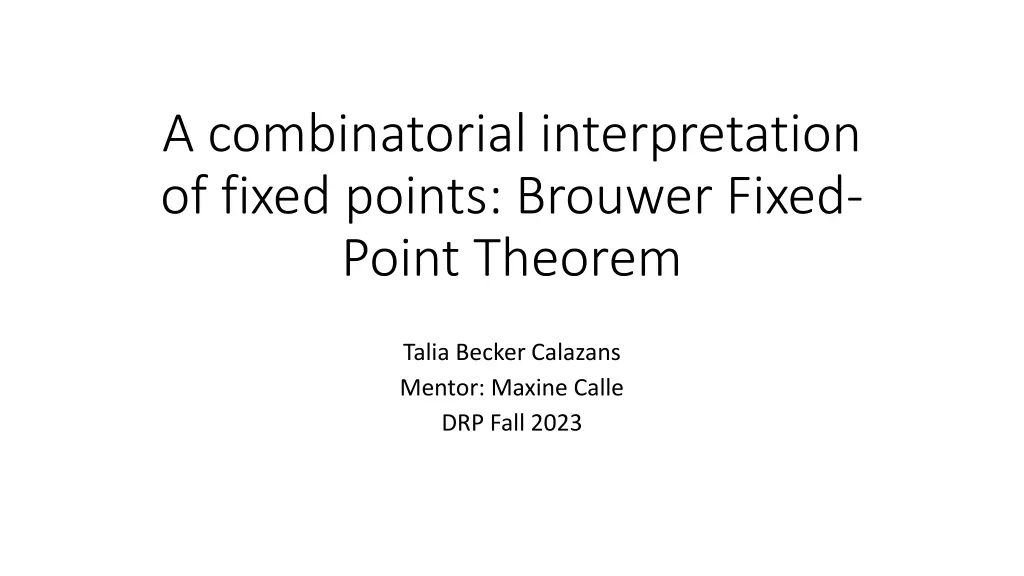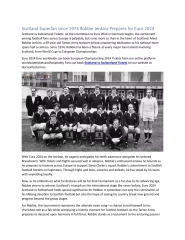
Understanding Fixed Points and Continuous Transformations in Mathematics
Explore the concept of fixed points and continuous transformations in mathematics through the lens of Brouwer's Fixed-Point Theorem. Learn how fixed points can help characterize topological spaces, and delve into the fascinating world of combinatorial interpretations of fixed points. Discover the significance of continuous transformations that preserve nearness and the implications of Brower's theorem on cells subjected to such transformations.
Download Presentation

Please find below an Image/Link to download the presentation.
The content on the website is provided AS IS for your information and personal use only. It may not be sold, licensed, or shared on other websites without obtaining consent from the author. If you encounter any issues during the download, it is possible that the publisher has removed the file from their server.
You are allowed to download the files provided on this website for personal or commercial use, subject to the condition that they are used lawfully. All files are the property of their respective owners.
The content on the website is provided AS IS for your information and personal use only. It may not be sold, licensed, or shared on other websites without obtaining consent from the author.
E N D
Presentation Transcript
A combinatorial interpretation of fixed points: Brouwer Fixed- Point Theorem Talia Becker Calazans Mentor: Maxine Calle DRP Fall 2023
Fixed points Points that are invariant given some transformation Given ?:? ? ??is a fixed point iff ? ?? = ?? Given a vector field ? ? that represents a function ? ? is a fixed point iff ? ? = 0
The study of fixed points Existence Stability
The study of fixed points Existence Stability Fixed points can help characterize topological spaces
Brouwer Fixed-Point Theorem Any continuous function mapping a nonempty compact convex set to itself has at least one fixed point A cell subjected to any continuous transformations onto itself will have a fixed point
Brouwer Fixed-Point Theorem A cell subjected to any continuous transformations onto itself will have a fixed point
Continuous Transformations - Transformations that preserve nearness - Do not need to preserve: Shape Size Angles Faces Vertices
NOT Continuous Transformations Poking a hole Tearing Gluing
Brower Fixed-Point Theorem A cell subjected to any continuous transformations onto itself will have a fixed point
Combinatorial Units Cells are any shape topologically equivalent to a closed disk Can be made by a continuous transformation Cells (simplices) can be joined to form any shape (complexes) Cells are compact bend glue
Brouwer Fixed-Point Theorem A cell subjected to any continuous transformations onto itself will have a fixed point
Proof Sketch 2D Case Take a triangle ? Take a vector field ? ? that represents a continuous transformation ?:? ? ?
Proof Sketch 2D Case Triangulate your vector field Find a triangle with all vectors pointing inwards
Proof Sketch 2D Case Triangulate your vector field Find a triangle with all vectors pointing inwards And so on
Proof Sketch 2D Case Until you get to a single point where all vectors point inwards There is a point Q for which V Q = 0 Q Q is a fixed point
Proof Sketch 2D case Sperner s Lemma guarantees there will always be one triangle with vectors pointing inward Compactness guarantees a triangle with length ? 0 By proving it for a triangular cell we have proved it for all cells
Some other examples ? ?,? = 0.1? ? + 0.1? ?
Some other examples ? ?,? = (? ?) ? + (? ?) ?
Some direct consequences If you lay down a map of DRL in DRL, some point on the map will correspond to its place in the building If you swirl your drink, some molecule will stay in the exact same place
More on fixed points Hairy Ball theorem Lefschetz fixed-point theorem Existence and uniqueness in analysis Stability theory
Applications Economics Nash equilibrium Physics orbits and oscillatory systems Biology Population modeling Programming compilers






















